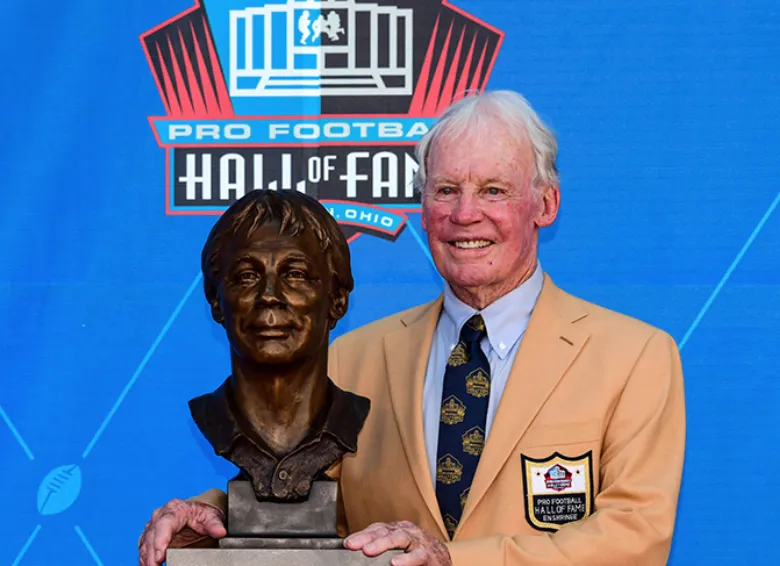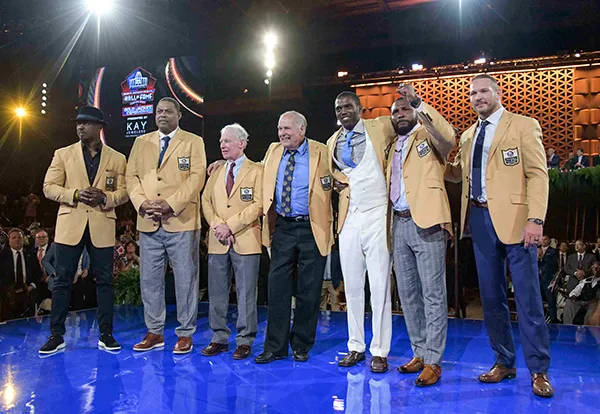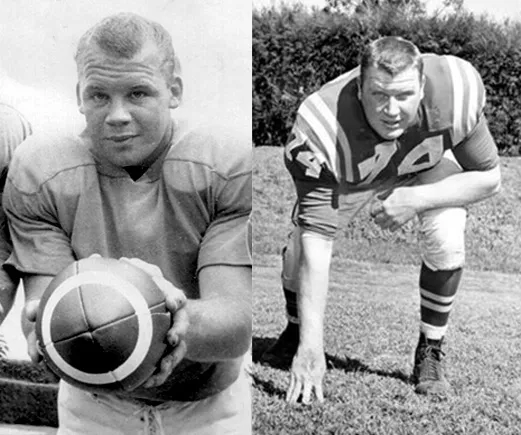Beathard and Madden: Roommates again after 66 years

When we heard that the great Pro Football Hall of Fame talent scout and NFL executive Bobby Beathard passed, Monday (January 30), I could close my eyes and hear him talking with his friend and roommate from 66 years ago, John Madden.
Back in 1957 at Cal Poly in California, Madden was a big senior tackle, and Beathard was a small (5-foot-9) junior quarterback. As roommates, they bonded over their love of football and foresaw a future in which they would work in professional football.

“I loved football,” Beathard told me in 2018 when he was in Canton for his induction. “I couldn’t get enough of it. John was the same way. We got to know each other in college. We always talked about being in football after we got out of there.”
Of course, they each wanted to be pro players, but that didn’t happen.
Madden, a 21st-round, 1958 draft pick of the Philadelphia Eagles, blew out his knee in training camp and spent much of his rookie year watching films with quarterback Norm Van Brocklin, which helped set the stage on which he created his great coaching career.
As for Beathard, well. . .
“Bobby was too darned short to play quarterback,” Madden said back in 2018 while discussing his former roommate’s induction. “But if he’d been given a real good shot, I bet he’d have made it. Bobby was little, but he could really throw the football. He was hard-nosed and had a lot of guts.”

Instead, Madden made his mark as one of the greatest coaches in pro football history, was at the heart of the No. 1 football video game of all time, and then became an iconic broadcaster with a roomful of Emmys.
Beathard’s career as an executive and talent-scout extraordinaire spanned four decades in the NFL. His teams — notably the Miami Dolphins, Washington, and San Diego Chargers — won 10 division titles, seven conference championships, and four Super Bowls.
Through it all, Madden and Beathard stayed as close as two guys in their profession could.
I had the privilege to be with them at times when they met up. One get-together that stands out was during an NFL owners meeting in Palm Springs in the 1970s. They left the hotel campus and ventured off to find a “real” Mexican restaurant. I tagged along and, as it turns out, it was a good thing I did.
As many of us learned years later during cross-country bus trips, Madden had a knack for discovering family-owned Mexican restaurants, which he and Beathard both liked.
This one near Palm Springs was a glorified family home out in the desert. The former roomies wasted little time daring each other to see who could ingest the hottest red or green chili sauce. They devoured the sauce with chips, and Madden requested of the cook — actually the family’s mother — “mas caliente,” meaning hotter.
She came back with hotter. Madden and Beathard were in their glory, doing what came naturally—competing. “Mas caliente,” Beathard said, and she made it hotter. Soon, Madden and Beathard were red-faced with tears in their eyes and still requesting “mas caliente.” The only winner was the Mexican family, who earned a huge tip. I drove back because Madden and Beathard were each sweating through their shirts, red-faced, and so teary-eyed that there was no way they could drive.
“Great times,” Madden said in 2018 when he recalled time spent with his old roommate.
While he never played pro football, Beathard managed astonishing physical feats. He was obsessed with body surfing and almost masochistic as a marathoner.
At an NFL meeting in Arizona, Beathard showed up all battered and bruised. “Fell off a surfboard, and that’s why I think body surfing is safer,” he said. A few years later, during an owners meeting at the famous Breakers hotel in Florida, Beathard stood outside in a cold, windy, rainstorm watching huge ocean waves crash against the shore. “Those would be a challenge," he said. We think he was kidding.
As for those marathons, his best time was an impressive two hours-30 minutes and he stayed in shape despite a busy work schedule, sometimes missing meetings so he could get in a run.
But his main focus was always football. It probably cost him his first marriage, to Larae Rich, with whom he had four children. When Beathard became a scout for the Atlanta Falcons in 1968, he was on the road so much that the marriage just fell apart.
He moved on, but his love for football endured, evidenced by a story in The Washington Post about the day in 1978 when he married Christine Van Handel at a friend’s home in Marina Del Ray, California. The wedding was delayed because Beathard and friends were upstairs watching an exhibition game between the Los Angeles Rams and Oakland Raiders.
At halftime, he raced downstairs for his wedding and was back upstairs before the third quarter.
“It was the fastest wedding I’ve ever seen,” Ted Grossman, a Hollywood stuntman and close friend, told the Los Angeles Times. “I was just turning around when Bobby’s putting the ring on Christine’s finger. The next thing I know, we’re going back upstairs to watch the game.
“I remember Christine asking, ‘Is this the way it’s always going to be?’" Bobby replied, "'I’m afraid so.'”
We hear many stories about those who are deep into football, but Beathard steered his obsession in his own unique way. Today’s football scouts and personnel staffs are hard into analytics, so much so it seems as if they are dissecting men from 10 feet away with a Hubble Telescope. Microchips are implanted in a players’ uniforms so a GPS device can actually measure their speed in miles per hour. Right, the NFL has gone NHRA.
In Beathard’s days as an evaluator, scouts collected 40-yard sprint times, measurements in the vertical jump and standing broad jump, and a variety of drills that reflect lateral agility. They still do. Beathard didn’t ignore that data, but neither did he live by it. He trusted his eyes, input from trusted colleagues, and, well, anything he found useful. He had a network of friends whose input he trusted, to a degree.
But in the end, Beathard said, “I trust my own instincts.”
“Bobby Beathard changed the way people looked at players,” veteran football writer Clark Judge said in a 2022 interview. “It wasn’t just the measurables. He had intuition and he would take chances on people others would not.”
How can you quantify that? Look at his results.
A story in The Washington Post tried to sum it up, pointing out that, while with Washington, he used the team’s first-round pick only three times. The 1983 Super Bowl championship team included 26 free agents signed by Beathard.
“Bobby could look beyond a 4.4 time or a 39-inch vertical jump and tell you if the guy was a player,” former All-Pro Los Angeles Rams running back and friend Jon Arnett told Sports Illustrated in 1988. “Any scout can clock or take a tape and measure a jump, which is what 90 percent of them do. All of us knew Bobby would find the real competitive guys, because he was so competitive himself.”
In the 1981 draft, Beathard plucked future Pro Bowlers such as guard Russ Grimm, defensive pass rusher Dexter Manley and wide receiver Charlie Brown in later rounds. That same year, he signed undrafted lineman Joe Jacoby, who earned four Pro Bowl selections.
When he did use his first-round pick, Beathard selected receiver Art Monk and cornerback Darrell Green, both Hall of Famers, and Pro Bowl offensive guard Mark May. May, Grimm and Jacoby were key members of the renowned “Hogs” offensive line that became one of the best in NFL history.
Asked about his intuition, Beathard told The Canton Repository: “Even in college, I seemed to have a feel for who the really good players on our team were. Whether it was loving the game, playing it, watching it. I don’t know what it was.”
Beathard moved to the San Diego Chargers after the 1988 season, but Washington won another Super Bowl in 1992 with a roster of players Beathard selected. He built the Chargers-only Super Bowl team, which lost the 1995 game to the San Francisco 49ers.
Beathard was introduced for his Hall of Fame induction by Joe Gibbs, the former Chargers assistant and Washington head coach, who was himself installed into the HOF two decades earlier.
“In the NFL, you’re measured by Super Bowls,” Gibbs said. “The bottom line was, if you hired Bobby Beathard, you got Super Bowls.”
Still, for all his success, Beathard is also remembered as the guy who, with the second pick of 1998, selected quarterback Ryan Leaf, who is in a mythical competition with quarterback JaMarcus Russell, the Raiders No. 1 overall pick in 2007, as the biggest draft bust in NFL history.
In all fairness, the Indianapolis Colts used the first pick in 1998 to take Peyton Manning, so we aren’t sure which player Beathard would have taken if he had a choice. That said, there was a lot of chatter comparing strong-armed Leaf with Brett Favre. Leaf’s life and career spiraled into a world of addiction and crime with a couple of personal comebacks, but never on the field.
“During my career I’ve never seen a player that had so much talent do so little with it,” Beathard told ESPN, regarding Leaf.
When Beathard talks about evaluating players, it seems he wishes he could have been judged in a manner similar to how he does it himself. He pointed out that Washington didn’t really give him a shot as a player because he was only 5-9.
“But they went with Eddie LeBaron, who was only 5-7, regardless of what the roster said,” Beathard insisted. “So, how can you tell unless you take an honest look?”
At El Segundo High, Beathard was a fast-footed single-wing tailback (that era’s version of today’s quarterback). At Cal Poly, he started at quarterback and defensive back in 1957 and 1958, leading his team to a 9-1 record each year. His younger brother, Pete, led USC to a national championship in 1962, was a No. 2 overall pick in 1964, and played pro football for 11 years.
“Yeah, he was 6-2,” Beathard said with a chuckle. “I wasn’t.”
But Bobby did something Pete didn’t. He made the Pro Football Hall of Fame. He and Madden realized their dream of being successful in pro football, even if it wasn’t the way they envisioned while chatting as college roommates.
When I learned of his passing, I immediately thought that they were together again, roommates in the Hall of Fame. OK, technically, they have been so since Beathard followed Madden into the Hall of Fame in 2018. But Beathard’s passing put a point on it.
Madden is the one who revealed during his induction in 2007 that each night when they turn out the lights at the Hall of Fame. “I believe the busts talk to each other ... That’s what I believe. That’s what I think is going to happen, and no one’s ever going to talk me out of that.”
Madden passed away in December 2021, and his bust was there on January 30, reunited with his roommate of 66 years earlier. I can hear them laughing and calling out, “Mas caliente!”